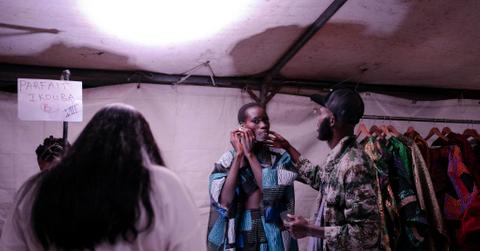
The Evolution of Afrocentric Fashion: From Traditional to Trendy
By Kennedy JumaNov. 10 2023, Published 10:43 p.m. ET
Afrocentric fashion is slowly becoming Africa’s favorite way of expression. The saying, “I am an African American Afrocentric woman,” is an acknowledgement of the traditional heritage of Africans, and no one is to be left behind. As the style becomes trendy, what’s your relationship to Afrocentricism? Perhaps you are wearing Afrocentric attire. Or you are just lured by this African-inspired trendy clothing?
Take a pause, and let’s first learn about the evolution of Afrocentric fashion and how this traditional dress, rich in history, cultural heritage, and contemporary trends, is becoming a global fashion. In this article, we will delve deep into the history and evolution of Afrocentric fashion, from its traditional roots to its current trendy status.
The Historical Roots of Afrocentric Fashion
The genesis of Afrocentric fashion dates back to the mid-1900s when the term Afrocentricity came into existence. It is a description of the impact of Western colonization upon Africans. During the Civil Rights Movement in the 1960s, Afrocentric dress was regarded as an exclusive fashion style for African Americans.
Traditional garments and skillfully woven dresses adorned with colorful fabrics and symbolic patterns filled American streets as a reflection of the spirit of unity among the people of color. Some embraced leopard skin, others zebra marks, but all were made of plain cotton.
For example, let’s look at the kente cloth of West Africa, representing the Ashanti community. The clothing is woven with patterns and symbols that show the cultural pride of West Africa. Therefore, traditional Afrocentric wear is a treasure of African culture.
With the rise of colonialism, Afrocentric fashion adapted to Western culture’s influence. European fabrics, styles, and techniques slowly crept into African designs, and at a time when Afrocentric fashion seemed to be losing its identity, most African nations gained independence. The more you learn about this style, the sooner you’ll be acquainted with matching trendy looks and outfits.
The Influence of Afrocentric Fashion on Modern Trends
Afrocentric fashion is taking the streets by storm, and we don’t want you to be left behind. Designers, celebrities, stylists, actors, and fashion enthusiasts globally identify with its authenticity. Can you remember any African fashion week without spotting Afrocentric clothing? I guess the answer is NO.
Fashion weeks in Africa and across the globe serve as platforms to showcase the trendy styles of Afrocentric fashion. Fashionistas like Ozwald Boateng, Duro Olowu, and Lisa Folawiyo have attained international acclaim for seamlessly blending traditional elements with contemporary flair.
Afrocentric fashion is also influencing social media spaces. Platforms such as Instagram and Pinterest are the media through which Africans express their traditional heritage. Through social platforms, Africans inspire a new generation of fashion enthusiasts to accept their color and stand against discrimination. Whether in music, film, arts, or any mainstream culture, Afrocentric fashion influences the norm.
Afrocentric fashion is visible in modern runways, red carpets, and personal wardrobes. The trendy colors, slick styles, and unique prints in Afrocentric designs represent self-expression and cultural pride. These pieces are a testament to the richness and diversity of the continent’s culture.
Afrocentric Apparel — A Must-Have Wardrobe Staple
As the vast continent continues to embrace Afrocentric clothing, you have no excuse to be left behind. From traditional style to modern trendy looks, the journey has been quite influential, and it’s time to be part of the movement. You are the 21st-century African-American Woman, and Afrocentric apparel is just a distance away. Whether it is Yoruba costumes, headwraps, dashiki apparel, or African prints, these attires represent the rich African heritage.

